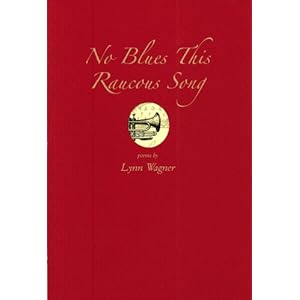No Blues This Raucus Song
By Lynn Wagner
(Slapering Hol Press, New York 2010).
24 ppgs. $12.00.
Reviewed by Deborah Bogen
_________________________________________________________________________________________
Winner of the 2009 Slapering Hol Press Chapbook Contest, Lynn Wagner’s No Blues This Raucous Song is a deep and constant yearning become art. It’s a striptease revealing desire’s complexities; what it does, feels like, denies, invites and despairs of. In the opening poem, "Unjust Spring", Wagner recognizes a “solitary heat” that can “burn a hole” in Spring’s cold start, but no matter how rich the world, no matter how sweet the honey bees’s promises, how moving the beauty of the iris’ “bruised tongues” the poet tells us “There is never enough.”
These poems claim life as insatiable hunger, as desire that can lead to temporary pleasure but which often does more to highlight loneliness than to assuage or console. Beauty there is in plenty, and jazz, nature, sex, all alive within the vast arena of choice a modern life can provide, but these glories are underwritten by a pining, an ache the speaker hopes to name in the night.
That the naming brings comfort is the book’s argument and moral. Such joy as there is in Wagner’s world will be found in noticing the tiger lilies growing by a wall, the skunk cabbage upstaging winter woods, the wonderful human mystery that creates from the blues an ecstasy that seems to be her own religion, and sex as a revelation of the body’s intimately foreign nature . Whether that’s enough is the poet’s question, since in the end “the tea kettle whistles alone.”
In Wagner’s poems lovers are temporary. They come, leave and even return to haunt, once in the form of “a sad-eyed nameless mutt/I invite in out of pity who pees/ in every room and is not ashamed when/ I push his nose in it…” Experienced this way the lovers are never compelling and the poet’s goodbye is flush with condescension as she says “I’ll hold the door for him// he’ll believe me when I say good dog attaboy/ go home now and then I’ll drive away.” For this speaker the truest avenue for relationship and deep focus is art — word-art and the communion she feels with her fellow practitioners.
Wagner’s use of language is a heady mix of the blues rhythms she reveres and reverberates to, and a lonely formality that puts her in a fishing boat with Elizabeth Bishop drinking, or invoking Emily Dickinson in the heat of her hellish room where the “the keys clacked ceaselessly all night long.” She is either aiming for the “high lonely pang” that “thump[s] in the sound-/box of [her] soul or sitting in Bishop’s “old gray skiff” tying off lines that she hopes will lure magic or truth or art from the deeps. Either way, in No Blues This Raucous Song her aim is often true and the reader will move from one poem to the other knowing she’s run into that fine thing: a poet bone-deep in her work, offering us a lit window into a secret room. In fact these fine poems prompt us to contradict the closing line of Excuses in Indigo where Wagner tells us “…I could not sing.” Oh, yes you can, we think. Yes. You can.
__________________________________________________________________________________________
Deborah Bogen's latest collection, Let Me Open You a Swan, is the winner of the 2009 Antivenom Prize from Elixir Press. Her earlier prize-winning books are Landscape with Silos and the chapbook Living by the Childrens Cemetery. Recent work has appeared in Poemeleon as well as New Letters, The Iowa Review, Crazyhorse, Ploughshares, Shenandoah and others. Her recent essay on the writing of Lynn Emanuel can be found online by googling "Emanuel Elegies Bogen."
